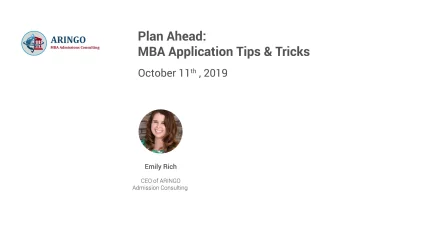An admissions officer shares some useful tips for getting admitted to SDA Bocconi (Italy).
[0:08] Q: So can you please introduce yourself and tell us a little bit more about your school - the school that you’re currently working for?
[0:16] A: My name is Joana Franco, I work at the recruiting and admissions office in SDA Bocconi. I’m a recruiting officer and our business school is located in the city center of Milan, Italy, and we have a wide range of Master’s that we propose, and three types of MBA – we have the full MBA, the Executive MBA, and the Global Executive MBA. And they are very international programs and we are a very nice business school in the center of the beautiful city of Milan.
[0:51] Q: How should MBA candidates come across in order to fit the mix that you’re looking for in the program?
[0:58] A: Our classes are usually quite international, so the best way to portray themselves ... it all starts with the application form, so we will ask a wide range of essay questions. We’re looking for people who have an international background, who are open-minded, who are used to being in a multicultural, multinational setting. In essay questions, we are looking for, you know, “triple A” candidates, so they must be ambitious, aspirational in terms of self-development, and self-aware and responsible. We also want candidates who are motivated, who know a little bit about our school, our values and our culture. So it really depends – we don’t have a perfect profile, a perfect candidate. We look for ambitious people, independent people, self-aware and critical people, so it’s a wide mix. The best advice that I can give is to prepare well for the motivational questions and be yourself, be genuine and authentic.
[2:26] Q: What kind of questions should applicants ask during the interview in order to come across well?
[2:32] A: There are no good or bad questions as such. Of course, if you have any questions, we are open to receive them. This shows that you made your research, that you are interested and motivated, that you delved into the program and you want to know more about the school, the program, or the faculty and the environment. So this is welcome because it shows interest. But we don’t pinpoint what are good or right questions and we are always open to receiving them.
[3:03] Q: What would be the most common mistakes to avoid during interviews or by the candidates during the application process?
[3:12] A: What we see sometimes is that answers to the motivational questions or essay questions appear to be pre-written or look as though they have been copy-pasted from other business schools. Of course, we know that candidates are often looking for different types of business schools and are not just choosing one. So sometimes the questions can be repetitive. But we want to understand who you are, your personality, and that you understood our values, our culture, and what we represent as a business school. So don’t write the same answers as you would to a different type of question from other business schools. Instead try to adapt and really think why we are asking this question. Try to understand the sense of the question and what we need to know about you to understand your personality, the career path that you have chosen, your passion and your mission.
[4:05] Q: What kind of admissions tests do you accept? Does your school accept GMAT, GRE, or another specific test?
[4:12] A: Specifically, for the full-time MBA we accept GMAT or GRE. For other kinds of Master’s and MBAs we also have our own internal test which is called the SDA Test. For example, for the full-time MBA, we don’t have a preference. GMAT or GRE is fine; the same goes for the other Master’s where we ask for the GMAT or SDA Test. So there is no preference; it’s really what the candidate feels more comfortable with, or what other business schools ask. Usually it’s more GMAT, so when candidates have already started with the process of studying the GMAT, we say OK, just continue with the GMAT and we will accept the GMAT as well –it’s fine.
[4:52] Q: What is the most important thing to know about essays?
[4:58] A: As I said, we have a couple of questions, the essays, and we want to understand your motivation, your strong points, your weak points, where you see yourself in a few years, why you want to do the same […], why with us, so it’s not only why you fit the MBA, but why we also match your aspirations and career goals. So we want to understand who you are and as an individual, and not, you know, just your suitability to be in the class or program. So try to be as personal as possible.
[5:37] Q: How can applicants ensure they get a scholarship?
[5:41] A: We actually have a variety of scholarships; we have 20 to 30, which is a big number, and we try to cover all types of profiles. So we have scholarships for different type of regions and nationalities, backgrounds, also for those with a legal or digital profile, and it really depends on the whole profile. Scholarships are merit-based; of course GMAT has its weight in there, but we try to see – OK – the academic background and path, the career progression so far, the leadership skills, and soft skills that this person developed throughout their career. We also look at the referees, so it’s a mix of their whole background and profile, and there are a lot of possibilities so there’s a good chance that someone will get the scholarship.
[6:38] Q: Do you pay more heed to certain sections of the GMAT over others?
[6:43] A: No. We received a total score and that’s what we look for. We don’t actually go and analyze different sections of the GMAT.


